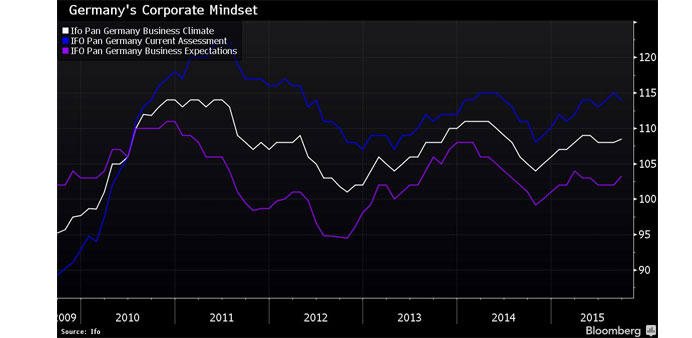Bloomberg/Hamburg
German business confidence unexpectedly increased in September as companies benefited from strengthening domestic demand in Europe’s largest economy, shrugging off risks from slowing growth in emerging markets.
The Ifo institute’s business climate index climbed to 108.5 from a revised 108.4 in August. The median estimate was for a decline to 107.9, according to a Bloomberg survey of economists. While the survey ran through this week, almost all responses were received before the news of Volkswagen’s emissions scandal which has shaken the German business community.
The German economy is expanding at its strongest pace since 2011, and the Bundesbank predicts that domestic demand will benefit from growing incomes and receding energy prices. The outlook for exports is less certain as emerging markets such as China struggle to rein in a weakening of growth.
“Extremely strong domestic demand pushes domestically focused parts of the economy like trade and services to strive,” said Andreas Scheuerle, an economist at Dekabank in Frankfurt. “Domestic demand is so strong that it compensates for a slowdown in manufacturing.”
Ifo’s gauge of expectations unexpectedly rose to 103.3 in September from 102.2. A measure for current conditions fell to 114 from 114.8.
Germany’s benchmark DAX Index briefly rose after the report. It was little changed at 9614.15 at 10:57 Frankfurt time. The euro stood $1.1199.
Business confidence in Germany may take a more serious hit from Volkswagen’s dramatic fall from grace that began last Friday with the revelation that Europe’s largest carmaker fitted diesel-powered vehicles with software that circumvented air-pollution controls. It led to the resignation of Martin Winterkorn as chief executive officer on Wednesday.
While a gauge of German manufacturing and services activity fell more than economists anticipated in September, orders rose at the fastest pace in almost two years in September, pushing a gauge of outstanding business to the highest since May 2011, Markit Economics said this week.
Germany’s chemical industry, which counts BASF and Bayer among its largest manufacturers, has increased its full-year sales-growth forecast as a weaker euro bolsters exports, especially to the US The boost comes even as emerging markets struggle to rein in a China-led economic slowdown.
Germany’s expansion in gross domestic product will pick up to 2.3% in 2017 from 1.8% this year, the Kiel Institute for the World Economy said on September 10. The Bundesbank raised its growth forecast for 2015 to 1.7% in June.

